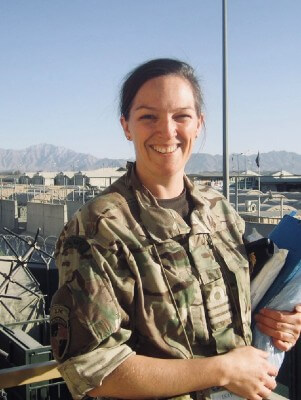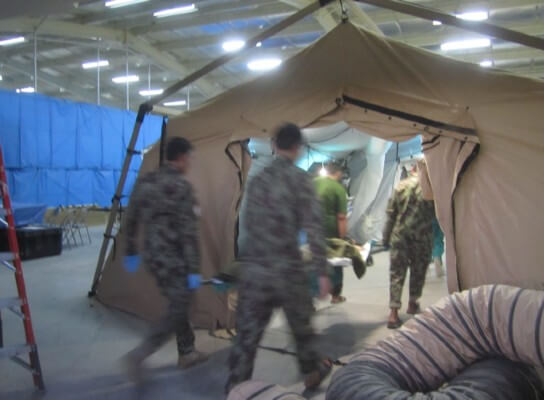It’s 50 degrees. You’re in one of the most remote and dangerous places on earth.
You’re in a large, dusty warehouse that’s serving as a temporary Afghan military trauma facility. Around you are roughly 30 Afghan soldiers and military personnel; there are seven Brits and Americans present and a handful of increasingly twitchy American force-protection types.
You’re running a “moulage” exercise, a mock drill to test how systems function under real conditions. But the feedback process is going badly. It’s the middle of Ramadan. Everyone is dehydrated and the atmospherics are turning – not in a good way.
You’re in charge. What’s your next move?
Surg Cdr Jo Keogh OBE was the senior coalition officer leading a small team that early June 2013 day in Camp Shorabak, Helmand Province. Being the only woman present added a whole extra dimension in an otherwise entirely male environment.

Surg Cdr Jo Keogh OBE while serving in Afghanistan
Jo had decades of leadership training behind her, which started at 18 when she joined the Royal Navy (RN) University Reserves and was subsequently sponsored through her degree in medicine by the RN. A couple of years later, at sea on board an RN frigate, she had to advise the Captain on the best decisions to take when a sailor became seriously ill mid-Atlantic; it was one of many situations as a very junior doctor when a decision taken on Jo’s clinical advice resulted in profound logistical and operational impact.
On her first tour in Afghanistan in 2011, Jo was a frontline radiology consultant making rapid assessments – up to 26 times a day – prioritising and reporting emergency CT scans on severely injured soldiers and civilians to guide surgical colleagues. Working for NATO in 2012 as the chief medical planner in Kabul, she was responsible for briefing “very, very, very senior officers from multiple nations.”
But in each situation she was well prepared and, on that broiling day in Helmand, Jo found the right move.
"What it goes back to, fundamentally, for me is learning another language," says Jo who recently completed three years in command of the Defence Medical Services Joint Hospital Group in the south-west of England, responsible for 190 personnel embedded within NHS hospitals. "In uncertain, extreme, changing environments, leaders must have taken the time to listen to their people. You've got to know your team. A lot of the time people make decisions or react to situations because they haven't actually understood what the other person is saying."

This picture, taken by Jo Keogh, shows the conditions in which medics worked in Afghanistan
That day in Helmand Jo began to realise that the feedback exercise was requiring her Afghan counterparts to speak up and criticise people who were senior to them; this model might be fine for British or American personnel, but culturally it was very uncomfortable for the Afghans. "As a radiologist, you're taught to look for the abnormal by learning what normal looks like first.
"This was not normal and one of the few moments in my life where I thought, 'okay Jo, we're really in the shit here, and you really need to get yourself out of this very, very quick'."
Jo's solution in hindsight seems simple. She got out her laptop and pulled up some images of the exercises they were reviewing. "I'm someone who thinks in pictures and takes a lot of photos, so I said, 'let's talk through these." The mood quickly changed. "We'd taken the situation away from a discussion about individual performance to one where we looked at how the team had done collectively."
More from CMI
That decision - to switch to a format that suited the people around her in this specific and unpredicted situation - was itself born out of a deep understanding of and commitment to open, authentic communication. Throughout her leadership career Jo has focused on the need to support those she is leading. As a commanding officer she encouraged new team members to write her a personal letter of introduction. This then acted as a platform for discussion, to understand the individual's motivation, how each fitted into the bigger team. It developed honest, respectful relationships from the outset.
At that perilous moment in Helmand Jo, who in 2016 completed the UK Military Advanced Command and Staff course (accredited by CMI), drew on a deep understanding of the people around her - and started speaking the appropriate language. "I made a very conscious choice not to simply wait for what happened next but to actively manage the situation."
